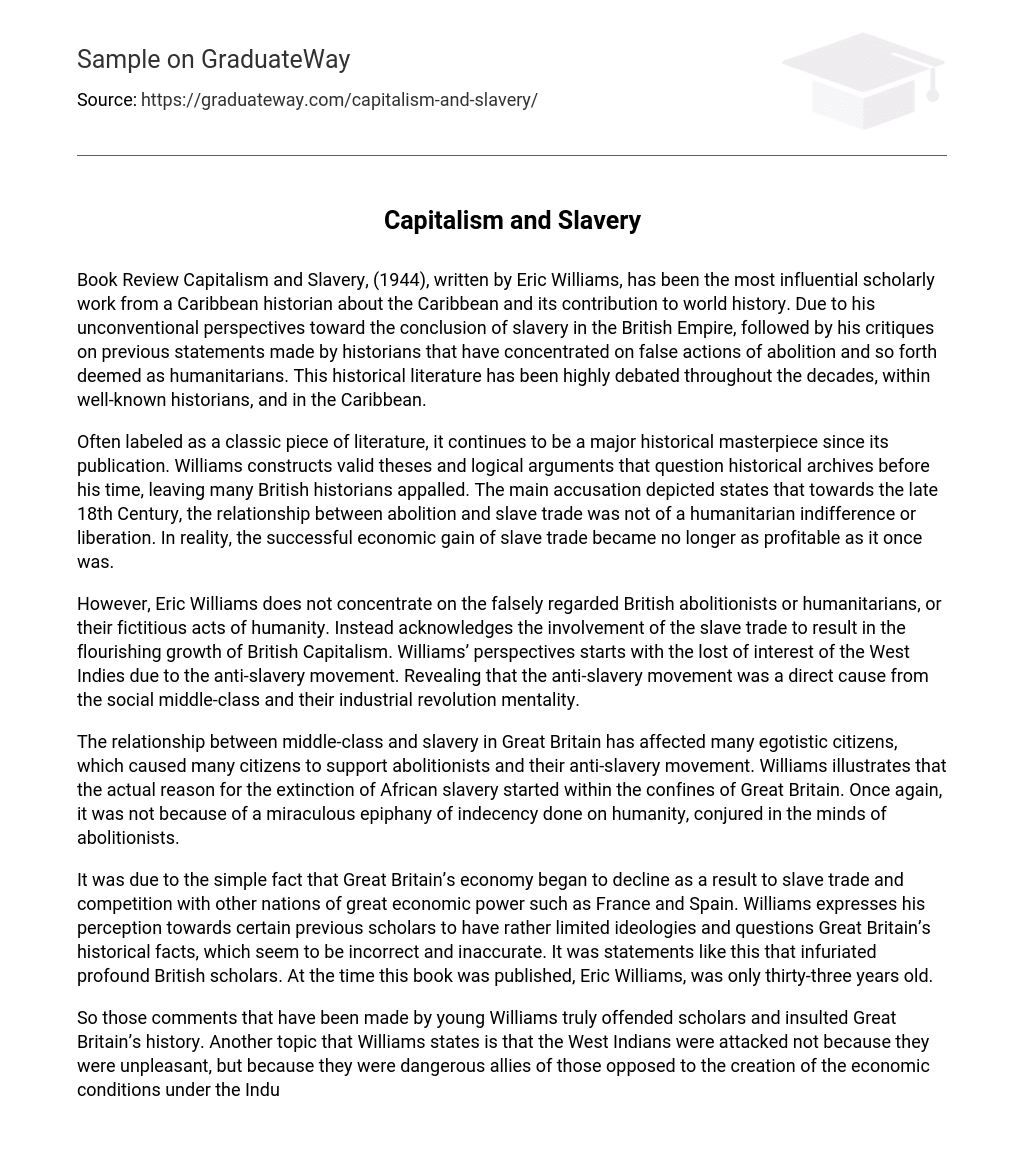Book Review Capitalism and Slavery, (1944), written by Eric Williams, has been the most influential scholarly work from a Caribbean historian about the Caribbean and its contribution to world history. Due to his unconventional perspectives toward the conclusion of slavery in the British Empire, followed by his critiques on previous statements made by historians that have concentrated on false actions of abolition and so forth deemed as humanitarians. This historical literature has been highly debated throughout the decades, within well-known historians, and in the Caribbean.
Often labeled as a classic piece of literature, it continues to be a major historical masterpiece since its publication. Williams constructs valid theses and logical arguments that question historical archives before his time, leaving many British historians appalled. The main accusation depicted states that towards the late 18th Century, the relationship between abolition and slave trade was not of a humanitarian indifference or liberation. In reality, the successful economic gain of slave trade became no longer as profitable as it once was.
However, Eric Williams does not concentrate on the falsely regarded British abolitionists or humanitarians, or their fictitious acts of humanity. Instead acknowledges the involvement of the slave trade to result in the flourishing growth of British Capitalism. Williams’ perspectives starts with the lost of interest of the West Indies due to the anti-slavery movement. Revealing that the anti-slavery movement was a direct cause from the social middle-class and their industrial revolution mentality.
The relationship between middle-class and slavery in Great Britain has affected many egotistic citizens, which caused many citizens to support abolitionists and their anti-slavery movement. Williams illustrates that the actual reason for the extinction of African slavery started within the confines of Great Britain. Once again, it was not because of a miraculous epiphany of indecency done on humanity, conjured in the minds of abolitionists.
It was due to the simple fact that Great Britain’s economy began to decline as a result to slave trade and competition with other nations of great economic power such as France and Spain. Williams expresses his perception towards certain previous scholars to have rather limited ideologies and questions Great Britain’s historical facts, which seem to be incorrect and inaccurate. It was statements like this that infuriated profound British scholars. At the time this book was published, Eric Williams, was only thirty-three years old.
So those comments that have been made by young Williams truly offended scholars and insulted Great Britain’s history. Another topic that Williams states is that the West Indians were attacked not because they were unpleasant, but because they were dangerous allies of those opposed to the creation of the economic conditions under the Industrial Revolution. The influences of the abolitionists were thus superficial. While Capitalism and Slavery was heavily criticized when it was first published, this book has changed the way that most scholars looked at abolition in the British Empire.
Before reading Capitalism and Slavery, my perspective towards the end of African slavery was conjured from the belief that noble humans stood for a righteous cause. Realization of what have been done by past human generations has finally been revealed. However, upon reading this historical novel, my perspectives towards the final era of slavery have been fairly altered. The arguments that Williams has written seem to have a strong background to them. These slaves weren’t just saved from a virtuous group, but unshackled by Capitalism. The desire of becoming prosperous tends to override humane morals and decency.
On the other hand, I still acknowledge the individuals that truly stood against slavery and wanted it abolished. One thing that I didn’t completely agree on was the tone in which some of the arguments were described. I came to an understanding that in a certain form, Williams was accusing Great Britain for the sudden lost of interest in the islands of the Caribbean and how it greatly affected the history of the Caribbean. Before reading this I only knew of two points of views on the topic of slavery coming from those of African-American descendants and that of a white male.
Nevertheless, I enjoyed learning another stance of how a fellow Trinidadian viewed slavery and its effects. Capitalism and Slavery truly is a historical masterpiece that makes the reader believe in the message that is trying to be conveyed. There are very few books that could install this belief into a reader. I honestly think that is the reason why this book has had such major success throughout the years. Learning about the unrestricted injustice that slavery caused is priceless.
Bibliography
- Williams, Eric. Capitalism and Slavery. The University of North Carolina Press, 1944.





